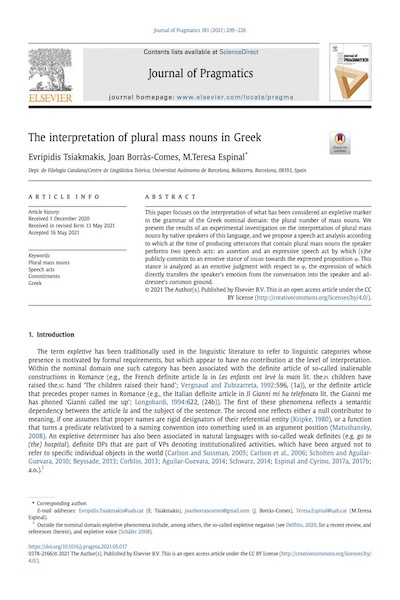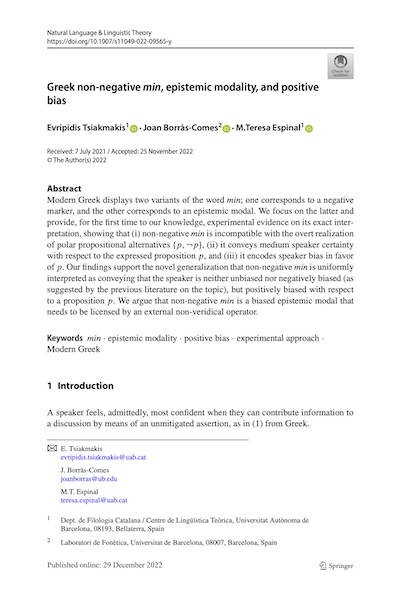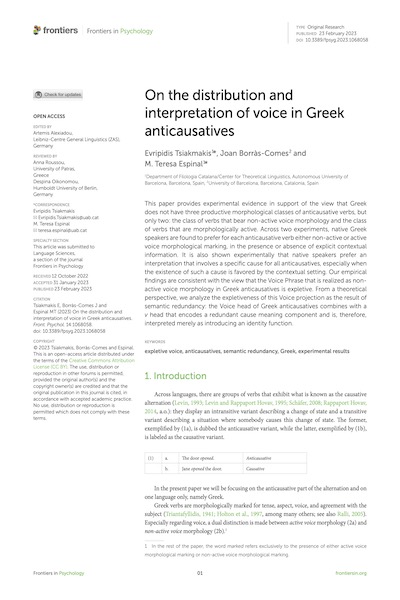14 juliol, 2021

Autors:
Evripidis Tsiakmakis, Joan Borràs-Comes, M.Teresa Espinal
Títol:
The interpretation of plural mass nouns in Greek, Journal of Pragmatics 181Editorial: Elsevier
Data de publicació: Agost 2021
Més informacióThis paper focuses on the interpretation of what has been considered an expletive marker in the grammar of the Greek nominal domain: the plural number of mass nouns. We present the results of an experimental investigation on the interpretation of plural mass nouns by native speakers of this language, and we propose a speech act analysis according to which at the time of producing utterances that contain plural mass nouns the speaker performs two speech acts: an assertion and an expressive speech act by which (s)he publicly commits to an emotive stance of dislike towards the expressed proposition φ. This stance is analyzed as an emotive judgment with respect to φ, the expression of which directly transfers the speaker's emotion from the conversation into the speaker and addressee's common ground.
29 desembre, 2022

Autors:
Evripidis Tsiakmakis, Joan Borràs-Comes & M.Teresa Espinal
Títol:
Greek non-negative min, epistemic modality, and positive biasEditorial: Natural Language & Linguistic Theory (Springer)
Data de publicació: 29 de desembre del 2022
Text completModern Greek displays two variants of the word min; one corresponds to a negative marker, and the other corresponds to an epistemic modal. We focus on the latter and provide, for the first time to our knowledge, experimental evidence on its exact interpretation, showing that (i) non-negative min is incompatible with the overt realization of polar propositional alternatives {p,¬p}, (ii) it conveys medium speaker certainty with respect to the expressed proposition p, and (iii) it encodes speaker bias in favor of p. Our findings support the novel generalization that non-negative min is uniformly interpreted as conveying that the speaker is neither unbiased nor negatively biased (as suggested by the previous literature on the topic), but positively biased with respect to a proposition p. We argue that non-negative min is a biased epistemic modal that needs to be licensed by an external non-veridical operator.
27 febrer, 2023

Autors:
Evripidis Tsiakmakis, Joan Borràs-Comes i M.Teresa Espinal
Títol:
On the distribution and interpretation of voice in Greek anticausatives. Frontiers in PsychologyEditorial: Frontiers
Data de publicació: 23 de febrer del 2023
Pàgines: 15 Text completThis paper provides experimental evidence in support of the view that Greek does not have three productive morphological classes of anticausative verbs, but only two: the class of verbs that bear non-active voice morphology and the class of verbs that are morphologically active. Across two experiments, native Greek speakers are found to prefer for each anticausative verb either non-active or active voice morphological marking, in the presence or absence of explicit contextual information. It is also shown experimentally that native speakers prefer an interpretation that involves a specific cause for all anticausatives, especially when the existence of such a cause is favored by the contextual setting. Our empirical findings are consistent with the view that the Voice Phrase that is realized as non-active voice morphology in Greek anticausatives is expletive. From a theoretical perspective, we analyze the expletiveness of this Voice projection as the result of semantic redundancy: the Voice head of Greek anticausatives combines with a v head that encodes a redundant cause meaning component and is, therefore, interpreted merely as introducing an identity function.








